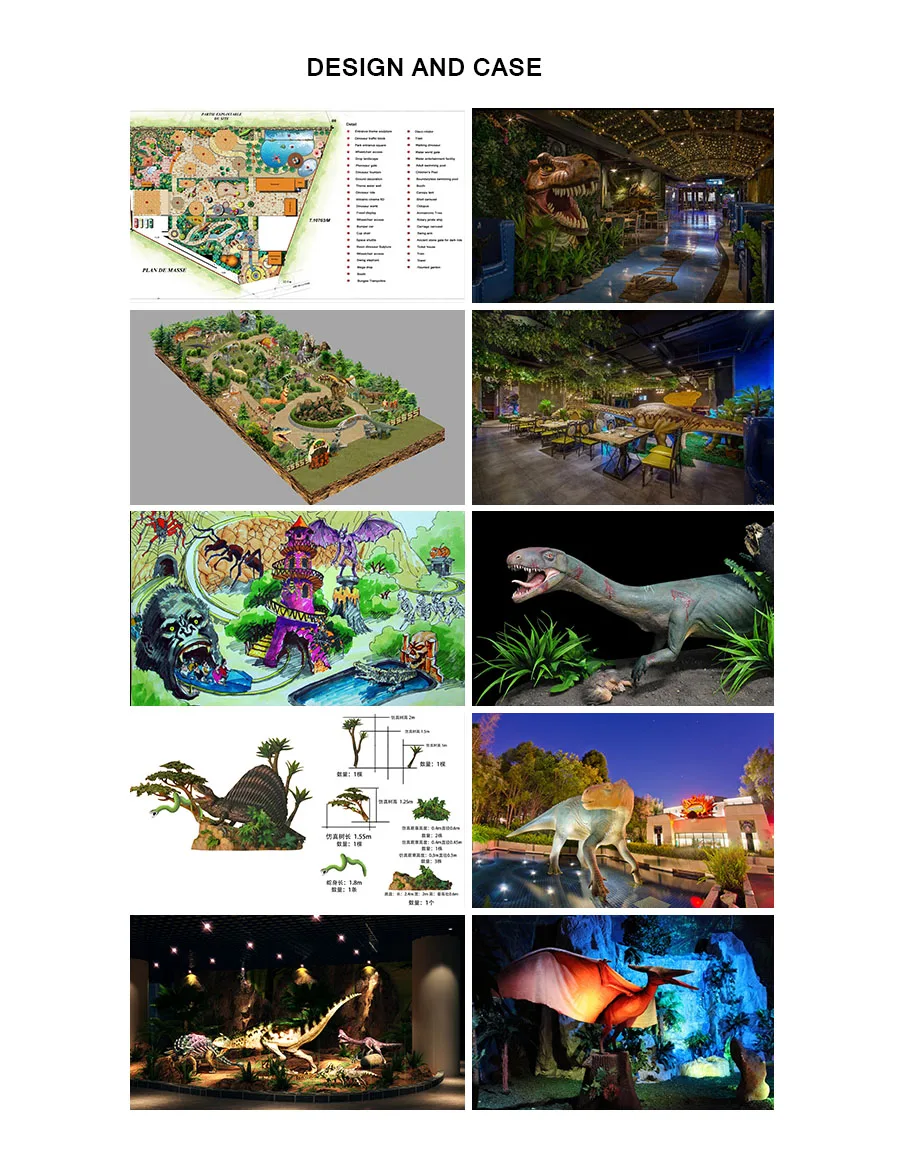Simulation Silicone Rubber Life Size Fake Animals
| Input | AC 110/220V ,50-60HZ |
| Plug | Euro plug / British Standard / SAA / C-UL / or depends on request |
| Control mode | Automatic / Infrared / remote / coin / Button / Voice / Touch / Temperature / shooting etc. |
| Waterproofing grade | IP66 |
| Working condition | Sunshine, rain, seaside, 0~50℃(32℉~82℉) |
| Optional function | Sound can be increased to 128 kinds Smoke,/ water. / bleed / smell / change color / change lights / LED screen etc interactive(Location tracking) / conversine(currently only Chinese) |
AFTER-SALE SERVICE
| Service | Need be cut for shipping,fwill provide a detailed installation manual. |
| Warranty | We provide 2 years warranty for all of our antrimatronic models, the warranty pieriod starts from freight arrives at destination port. Our warranty covers motor, reducer, control box, etc. |






 life-size animal lifelike animal theme park
shark model animatronic shark life size animatronic shark mechanical shark robotic shark animatronic shark for sale realist animal model playground equipment for sale robotic animal model lifelike animal model statue animatronics animated life size animals animatronic sculpture life size artificial animal outdoor playground life size animal outdoor animal playground equipment silicone decoration silicone decoration
Sharks are a group of elasmobranch fish characterized by a cartilaginous skeleton, five to seven gill slits on the sides of the head, and pectoral fins that are not fused to the head. Modern sharks are classified within the clade Selachimorpha (or Selachii) and are the sister group to the rays. However, the term "shark" has also been (incorrectly) used for extinct members of the subclass Elasmobranchii outside the Selachimorpha, such as Cladoselache and Xenacanthus, as well as other Chondrichthyes such as the holocephalid eugenedontidans.
Under this broader definition, the earliest known sharks date back to more than 420 million years ago. Acanthodians are often referred to as "spiny sharks"; though they are not part of Chondrichthyes proper, they are a paraphyletic assemblage leading to cartilaginous fish as a whole. Since then, sharks have diversified into over 500 species. They range in size from the small dwarf lanternshark (Etmopterus perryi), a deep sea species of only 17 centimetres (6.7?in) in length, to the whale shark (Rhincodon typus), the largest fish in the world, which reaches approximately 12 metres (40?ft) in length. Sharks are found in all seas and are common to depths of 2,000 metres (6,600?ft). They generally do not live in freshwater although there are a few known exceptions, such as the bull shark and the river shark, which can be found in both seawater and freshwater. Sharks have a covering of dermal denticles that protects their skin from damage and parasites in addition to improving their fluid dynamics. They have numerous sets of replaceable teeth.
life-size animal lifelike animal theme park
shark model animatronic shark life size animatronic shark mechanical shark robotic shark animatronic shark for sale realist animal model playground equipment for sale robotic animal model lifelike animal model statue animatronics animated life size animals animatronic sculpture life size artificial animal outdoor playground life size animal outdoor animal playground equipment silicone decoration silicone decoration
Sharks are a group of elasmobranch fish characterized by a cartilaginous skeleton, five to seven gill slits on the sides of the head, and pectoral fins that are not fused to the head. Modern sharks are classified within the clade Selachimorpha (or Selachii) and are the sister group to the rays. However, the term "shark" has also been (incorrectly) used for extinct members of the subclass Elasmobranchii outside the Selachimorpha, such as Cladoselache and Xenacanthus, as well as other Chondrichthyes such as the holocephalid eugenedontidans.
Under this broader definition, the earliest known sharks date back to more than 420 million years ago. Acanthodians are often referred to as "spiny sharks"; though they are not part of Chondrichthyes proper, they are a paraphyletic assemblage leading to cartilaginous fish as a whole. Since then, sharks have diversified into over 500 species. They range in size from the small dwarf lanternshark (Etmopterus perryi), a deep sea species of only 17 centimetres (6.7?in) in length, to the whale shark (Rhincodon typus), the largest fish in the world, which reaches approximately 12 metres (40?ft) in length. Sharks are found in all seas and are common to depths of 2,000 metres (6,600?ft). They generally do not live in freshwater although there are a few known exceptions, such as the bull shark and the river shark, which can be found in both seawater and freshwater. Sharks have a covering of dermal denticles that protects their skin from damage and parasites in addition to improving their fluid dynamics. They have numerous sets of replaceable teeth.

+86-813-2104677

info@sanherobot.com

+86-13990010824

No.13 Huixin Road, Yantan Town, Yantan District, Zigong City, Sichuan Province, China